|
If you're in your 40s
or 50s and feeling a bit left out of the explosive growth in India
Inc., then you're not alone. In several new age industries, 30-something
ceos have almost become the norm and many companies now prefer
the exuberance of youth over the cool head of experience. Result:
there's a different kind of midlife crisis staring mid-career
executives across industries.
Executives in the 40-50 age group, especially those in mid-level
jobs, need to seriously look at how to stay relevant in this youth-driven
job market. "Many people in this age group must learn to
graduate from being proficient in just one field, say technology,
to adopting a much more holistic view of their company and, indeed,
their industry," says Srinivas Shirgurkar, Managing Director
of Ace Designers, a Bangalore-based machine tools company. Infrastructure
major Larsen & Toubro (L&T) has its own programmes to
mould its people to face the challenges of working in today's
dynamic environment. "Employees at this level undergo management
development and competency enhancement programmes to enhance their
skills; this is a far better option than trying to retro-fit them
into a new job," says the L&T spokesperson. Then, companies
like Tata Steel have in-depth and across the board re-skilling
programmes for their employees. "We strongly believe in enhancing
people capabilities through learning and development. This is
one of our key initiatives to retain talent. Programmes are designed
to enhance managerial, functional and cross-cultural capability
to deliver effectively in the globalised business environment,"
says Radhakrishnan Nair, Chief HRO (Human Resource Officer), Tata
Steel. That's lesson #1: go in for reskilling; it won't be easy
going back to the classroom after more than two decades of working.
If you find it difficult, motivate yourself into believing that
it is just another hard assignment.
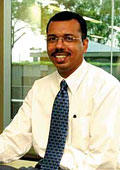 |
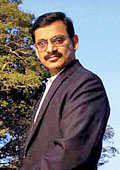 |
"There are not enough
45-year-old bankers in the market to recruit and most of them
are culturally backward and bring with them old skills"
K. Ramkumar
Head (HR)/ ICICI Bank |
"We've recruited retired
defence personnel, for instance, who are well trained in managing
chaos"
S. Nagarajan
Head (HR)/24/7 Customer |
D.V. Narasingarao, 46, part of the founding team at SSI, an erstwhile
it education and support solutions company headquartered in Chennai,
started his career with Wipro (back when it was doing both hardware
and software as a single unit) and then moved on to a technical
support position with an Oracle channel partner in Dubai before
returning to India and turning entrepreneur, helping set up SSI.
Four years ago, Narasingarao decided to move away from the daily
grind after SSI exited software and got into real estate. He did
an MBA and joined e4e, an ITEs company providing solutions in
technical support, financial services and healthcare, as Executive
Vice President (Strategic Operations). "Youngsters who have
not been exposed to the License Raj are so unfettered and don't
believe in obstacles. They think that nothing can stop India conquering
the world," he says, adding that he now sees himself as a
mentor to young executives who're in a hurry to make their mark.
That's lesson #2: don't let grey hairs become a burden; there's
a market for experience; make the most of it.
K. Radhakrishnan, 48, Chief Executive (Hypermarkets), Reliance
Retail, says it's important to make the most of experiential learning.
He himself started life as a tea taster, moved into management,
launched a noodle company, Indo-Nissin Foods, helped launch RPG
Retail before moving to his current position, all without any
formal degree in management. "Degrees don't have a life beyond
three years," he says, "but relentless hard work is
what keeps you relevant in the job market." His advice to
executives facing mid-career blues: "Dissatisfaction arises
because of a mismatch between reality and expectations; these
should be suitably downgraded or upgraded to meet your state of
mind," he says. Lesson #3: even if you see some young (or
not so young) gun outshooting you, persist with your hard work;
as the old saying goes, you can't keep a good man down for long.
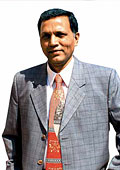 |
"Age is
not an issue in our industry; we still value experience and
relevant skill sets"
Pradeep Pande
President (HR)/Ispat |
But keeping pace with others, and with your own ambitions, often
involves additional training to learn new skills-and this is relevant
even for executives who haven't reached the "danger"
age group yet. Start early, and keep re-orienting yourself to
the changing environment around you. Says Subbarao Hegde, 45,
Chief Technology Officer, GMR Group: "There will always be
place for a specialist like me, even in today's youth-dominated
market." It's a position he has reached the hard way. In
1998-99, he filled up a critical gap in his knowledge portfolio
by taking a course in total quality management in Japan. "I
was then working in Gujarat Co-operative Milk marketing Federation
(better known for its Amul brand) and wanted to introduce the
latest management techniques there," he says. Several more
courses, including one at Institute of Rural Management in Anand,
Gujarat, later, he joined the GMR Group, where he often has to
camp out at various remote project sites overseeing the establishment
of the group's technology backbone. That's lesson #4: get your
hands dirty, take up an assignment that others in your position
would prefer to avoid. You'll soon become indispensible to your
organisation.
According to Ganesh Chella, CEO of Chennai-based Totus Consulting,
a third party hr consulting services firm, executives in the 45-plus
category tend to face uncertainties on the career front. They
need to take a call on whether to focus strongly on their careers
or make more time for their families. He says that rather than
stay on at mid-, or even junior managerial positions in large
companies, it may be a good idea to consider switching jobs and
working with smaller companies or moving into charitable organisations
and NGOs. "I have seen many people move from top companies
to SMEs and educational institutions," says Chella. Lesson
#5: Consider all options carefully before deciding to switch jobs.
In this age group, it doesn't usually make sense to move for a
few thousand rupees more; comfort levels are more important. So,
switch jobs only if it adds value to your career.
MID-LIFE MANTRA
Here's what you can do to stay afloat
in a fast-changing job market. |
»
Define your priorities. Is it a) Money,
b) Power, c) Respect, d) Time for family, and e) Hobbies or
a combination of these that you want to pursue. Solutions
come with clarity and there are enough of them if only you
look around
»
Be alert to trends; you should spot them faster than youngsters
because of your maturity. There could be opportunities to
grow and even mentor youngsters
»
Check out your physical health status. Take proactive and
remedial measures if you are in a high stress job-or switch
to a less stressful one
»
Reskill and reinvent yourself; that's ultimately the best
way to remain relevant |
But it's not as if all is lost for 40-plus executives who still
haven't become CEOs. "We've recruited retired defence personnel,
for instance, who are well trained in managing chaos," says
S. Nagarajan, Head (hr), 24x7 Customer, a BPO.
Then, the 40-plus crowd remains in great demand in the manufacturing
sector, says S.B. Ganguly, Chairman-Emeritus of Exide Industries.
"In Exide, the average age across the organisation is 50.9
and we have no reason to consider changing this," he says.
Adds A.K. Mukherjee, 46, Director, Finance, Exide: "In the
manufacturing sector, one needs at least 15-16 years experience
to master the business processes of an industry. Only then can
one contribute significantly to one's organisation. From my own
experience, I can say, that 45 is the ideal age at which to start
aiming for the top." This is corroborated by Pradeep Pande,
President (HR), Ispat Group. "Age is not an issue in our
industry; we still value experience and relevant skill sets,"
he says, but admits that the average age in his company has come
down over the years.
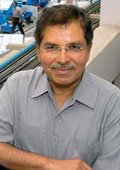 |
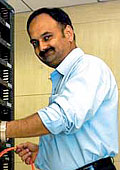 |
"People must learn to
graduate from being proficient in just one field to adopting
a more holistic view"
Srinivas Shirgurkar
MD/Ace Designers |
"There will always be
place for a specialist like me, even in today's youth-dominated
market"
Subbarao Hegde
Chief Technology Officer/GMR |
But some hr heads say that the greatest barriers for 40-plus
execs are social and psychological in nature. "There are
not enough 45-year-old bankers in the market to recruit, and most
of those available are culturally backward and bring old skills
to the table," says K. Ramkumar, Head (HR), ICICI Bank. "Most
people in this age group also have problems adjusting to younger
professionals; so, and it's not ability alone but social skills
which are important." Often, this could involve the bitter
pill of adjusting to a superior who could be younger or the same
age as a 40-something executive. Lesson #6: take up a game or
join a club; you will get to interact socially with a heterogeneous
age group, perhaps lose a game or two to a younger opponent and
also meet successful professionals younger than you. Over time,
this will make the concept of a younger boss more acceptable to
you.
But the moral of the story: don't lose heart even if you feel
you're losing out because of your age. You can, with a little
effort, make yourself relevant to your employer once again. And
even if you can't, there's always some other company that may
value your skills more.
-additional reporting by Ritwik
Mukherjee and Anusha Subramanian
'Hospitalisation'
Pays
Expanding hospital chains offer great careers.
The healthcare sector
is booming, hospital chains are expanding and newer players are
entering the fray. This is creating a deluge of jobs across specialisations.
And it's not just doctors and other medical personnel who're in
demand. Large hospitals today need trained lobby managers, housekeepers,
finance personnel, investment advisors, marketing personnel, engineers
and others to keep them ship shape. "The scope is enormous;
the problem lies on the supply side. There is a huge deficiency
of well-trained personnel to man the positions," says Dr
Amit Ghosh, a renowned surgeon in Kolkata and Chairman of Bengal
Chamber of Commerce's Health Sub-committee, which recently bought
out a study on the subject. And the best part is that leading
hospitals pay salaries at par with the hotel chains with whom
they compete for talent.
-Ritwik Mukherjee
FACT BOX
WHO'S HIRING: Apollo Hospitals, Fortis, Max Healthcare
and almost every other hospital chain and standalone general and
specialty hospital
WHO'RE THEY HIRING: MBAs, finance professionals, hospitality
industry veterans and, of course, doctors and para-medical staff
AT WHAT LEVEL: At all levels; mid-level, junior and entry-level
recruitments are most common
AT WHAT SALARIES: Senior doctors can get more than Rs
1 crore p.a.; top non-medical professionals can expect about half
this pay. At mid-levels: Rs 12-50 lakh p.a.; at junior and entry
levels: Rs 2-8 lakh p.a.
WHAT ARE THE NUMBERS LIKE: At least 25,000-30,000 jobs
will be created over the next five years
COUNSELLING
Help, Tarun!
 Q: I am a 23-year-old M.Tech civil engineer working for a construction
company in a Tier-II city. Since I am involved in the marketing
function of the organisation, is it advisable for me to pursue
a specialised marketing course for better career prospects? What
are the other growth avenues, especially in the realty sector?
Q: I am a 23-year-old M.Tech civil engineer working for a construction
company in a Tier-II city. Since I am involved in the marketing
function of the organisation, is it advisable for me to pursue
a specialised marketing course for better career prospects? What
are the other growth avenues, especially in the realty sector?
An MBA in Marketing will enhance your career prospects. With
your qualifications, there will be many avenues open to you, including
in real estate and construction companies. It is an industry that
is in the process of becoming more professional. Also, you may
want to explore sectors like building materials and constuction.
Q: I am a 21-year-old English graduate and have just
been offered a job as a technical writer in a major IT company.
What are the prospects in this particular field and how is it
different from content writing?
Technical writing is a field that will give you a steady career.
If you have a technical bent of mind and enjoy it-related work,
then this is a good option. However, since you do not have much
of a technical background, it might also stifle your growth. A
related option is content and copy writing. These are growing
fields and hold a lot of promise.
Answers to your career concerns are contributed
by Tarun Sheth (Senior Consultant) and Shilpa Sheth (Managing
Partner, US practice) of HR firm, Shilputsi Consultants. Write
to Help,Tarun! c/o Business Today, Videocon Tower, Fifth Floor,
E-1, Jhandewalan Extn., New Delhi-110055.
|





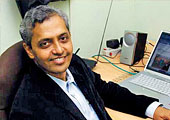





 Q: I am a 23-year-old M.Tech civil engineer working for a construction
company in a Tier-II city. Since I am involved in the marketing
function of the organisation, is it advisable for me to pursue
a specialised marketing course for better career prospects? What
are the other growth avenues, especially in the realty sector?
Q: I am a 23-year-old M.Tech civil engineer working for a construction
company in a Tier-II city. Since I am involved in the marketing
function of the organisation, is it advisable for me to pursue
a specialised marketing course for better career prospects? What
are the other growth avenues, especially in the realty sector?